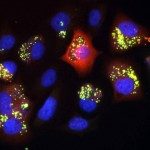Lien vers Pubmed [PMID] – 39835815
Lien vers HAL – pasteur-05052306
Lien DOI – 10.1128/mbio.02526-24
mBio, 2025, 16 (3), ⟨10.1128/mbio.02526-24⟩
Mycobacteria, including pathogens like Mycobacterium tuberculosis , exhibit unique growth patterns and cell envelope structures that challenge our understanding of bacterial physiology. This study sheds light on FhaA, a conserved protein in Mycobacteriales , revealing its pivotal role in coordinating cell envelope biogenesis and asymmetric growth. The elucidation of the FhaA interactome in living mycobacterial cells reveals its participation in the protein network orchestrating cell envelope biogenesis and cell elongation/division. By manipulating FhaA levels, we uncovered its influence on cell morphology, cell envelope organization, and the localization of peptidoglycan biosynthesis machinery. Notably, fhaA deletion disrupted the characteristic asymmetric growth of mycobacteria, highlighting its importance in maintaining this distinctive feature. Our findings position FhaA as a key regulator in a complex protein network, orchestrating the asymmetric distribution and activity of cell envelope biosynthetic machinery. This work not only advances our understanding of mycobacterial growth mechanisms but also identifies FhaA as a potential target for future studies on cell envelope biogenesis and bacterial growth regulation. These insights into the fundamental biology of mycobacteria may pave the way for novel approaches to combat mycobacterial infections addressing the ongoing challenge of diseases like tuberculosis in global health. IMPORTANCE Mycobacterium tuberculosis , the bacterium responsible for tuberculosis, remains a global health concern. Unlike most well-studied model bacilli, mycobacteria possess a distinctive and complex cell envelope, as well as an asymmetric polar growth mode. However, the proteins and mechanisms that drive cell asymmetric elongation in these bacteria are still not well understood. This study sheds light on the role of the protein FhaA in this process. Our findings demonstrate that FhaA localizes at the septum and asymmetrically to the poles, with a preference for the fast-growing pole. Furthermore, we showed that FhaA is essential for population heterogeneity and asymmetric polar elongation and plays a role in the precise subcellular localization of the cell wall biosynthesis machinery. Mycobacterial asymmetric elongation results in a physiologically heterogeneous bacterial population which is important for pathogenicity and response to antibiotics, stressing the relevance of identifying new factors involved in these still poorly characterized processes.



